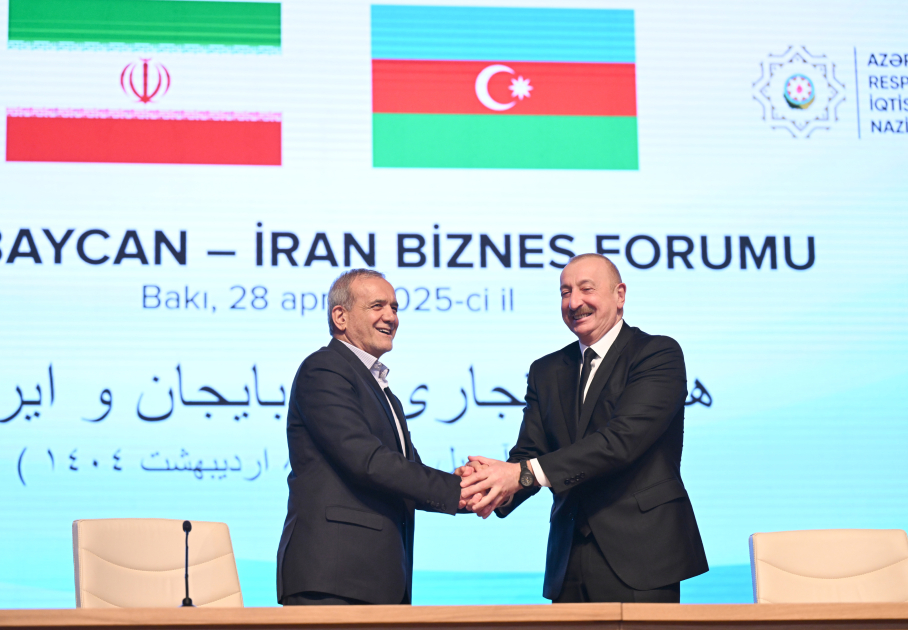Baku, Tehran ink infrastructure deals to anchor regional connectivity

The official visit of Azerbaijani President Ilham Aliyev to Tehran, culminating in the signing of a Joint Presidential Statement and multiple intergovernmental agreements, marks a watershed moment in Azerbaijan-Iran relations. Against the backdrop of mounting global instability, supply chain disruptions, and a shifting balance of power, Baku and Tehran are charting a pragmatic course toward regional self-reliance, economic integration, and multilateral cooperation.
During the high-level meetings held on April 28, Presidents Ilham Aliyev and Masoud Pezeshkian oversaw the signing of numerous strategic agreements, including comprehensive cooperation in transport, cultural exchange, mutual recognition of maritime certifications, and media collaboration. These agreements provide a robust institutional foundation for what is now being called a "comprehensive regional partnership" between the two nations.
The Azerbaijan-Iran Business Forum, held the same day in Baku with the participation of over 400 delegates, including 120 prominent Iranian entrepreneurs, demonstrated a strong private sector appetite for cross-border collaboration. In his keynote speech, President Aliyev acknowledged the political maturity and mutual respect defining Azerbaijan-Iran relations and emphasised the need to translate this into real economic outcomes. With bilateral trade hovering around $650 million in 2024—a 33% increase from the previous year—both sides agreed that current figures fall well short of the vast economic potential.
Unlocking Eurasian trade potential through boosting Araz corridor
One of the focal points of the bilateral talks was the development of trans-regional transport corridors—particularly the North-South and Araz Corridors—which are now seen as game-changers for trade flows from the Indian Ocean to the Black Sea, and from the Caspian to the Mediterranean. With work on the Alat-Astara railway and the Aghbend-Kalala connection progressing, both sides believe that the new rail and highway infrastructure can convert Azerbaijan and Iran into key Eurasian transit hubs.
President Aliyev confirmed that the Azerbaijani section of the bridge across the Araz River is nearing completion and will be operational by the end of 2025. This will link mainland Azerbaijan to the Nakhchivan Autonomous Republic via Iranian territory and serve as a major transit artery connecting Asia with Europe. More than just a connectivity project, this corridor has the potential to trigger a domino effect of industrial development along its route.
Besides all the significant documents and agreements, this visit should be seen as a condition for the Azerbaijani President to normalize relations with the Iranian authorities. Masoud Pezeshkian's visit to Azerbaijan represents an effort by the Iranian government to ease the tensions that have developed between the two countries. This is significant for expanding the relations that began during Ibrahim Raisi's presidency and for normalizing ties moving forward.
President Pezeshkian’s address at the business forum went beyond protocol, calling for the establishment of a Muslim-majority regional economic bloc anchored in shared history, culture, and economic need. He proposed the creation of transnational trade routes connecting Pakistan, Iran, Azerbaijan, Iraq, and Türkiye—not just in theory but in practice through rail, road, and academic exchange. “Trade is security,” he stated, arguing that deeper interdependence could replace military deterrence and foreign intervention with trust and mutual benefit.
This line of thinking aligns with Azerbaijan’s broader strategic posture—one that increasingly favors multipolar cooperation, diversification of energy routes, and South-South partnerships over reliance on a West-dominated geopolitical and economic system. For both countries, expanding cooperation is not just about growth—it’s about reclaiming agency in an increasingly fragmented global order.
As Azerbaijan races toward a green energy future—with 6,500 MW of renewable capacity targeted by 2030—Iranian firms are being invited to participate in solar, wind, and hydro projects. Joint management of water resources along the Araz River, as well as potential collaborations in agriculture, petrochemicals, and construction, were also discussed.
The tourism sector is poised to benefit quickly, as both countries ease travel restrictions and promote people-to-people exchange. The historic Khudafarin Bridge, which will celebrate its 1,000th anniversary in 2027, has been proposed as the venue for a landmark cultural summit to mark a millennium of shared heritage.
In the broader context, this visit represents more than bilateral diplomacy—it is a blueprint for a new kind of regionalism that values sovereignty, economic pragmatism, and cultural solidarity. The tone set by both leaders and the tangible outcomes of their summit suggest a future where Azerbaijan and Iran are not merely neighbours but partners in shaping a more equitable and interconnected region.
By investing in infrastructure, fostering mutual trust, and resisting foreign interference, Azerbaijan and Iran are demonstrating that regional cooperation rooted in shared values and common interests can deliver both peace and prosperity.
Here we are to serve you with news right now. It does not cost much, but worth your attention.
Choose to support open, independent, quality journalism and subscribe on a monthly basis.
By subscribing to our online newspaper, you can have full digital access to all news, analysis, and much more.
You can also follow AzerNEWS on Twitter @AzerNewsAz or Facebook @AzerNewsNewspaper
Thank you!

